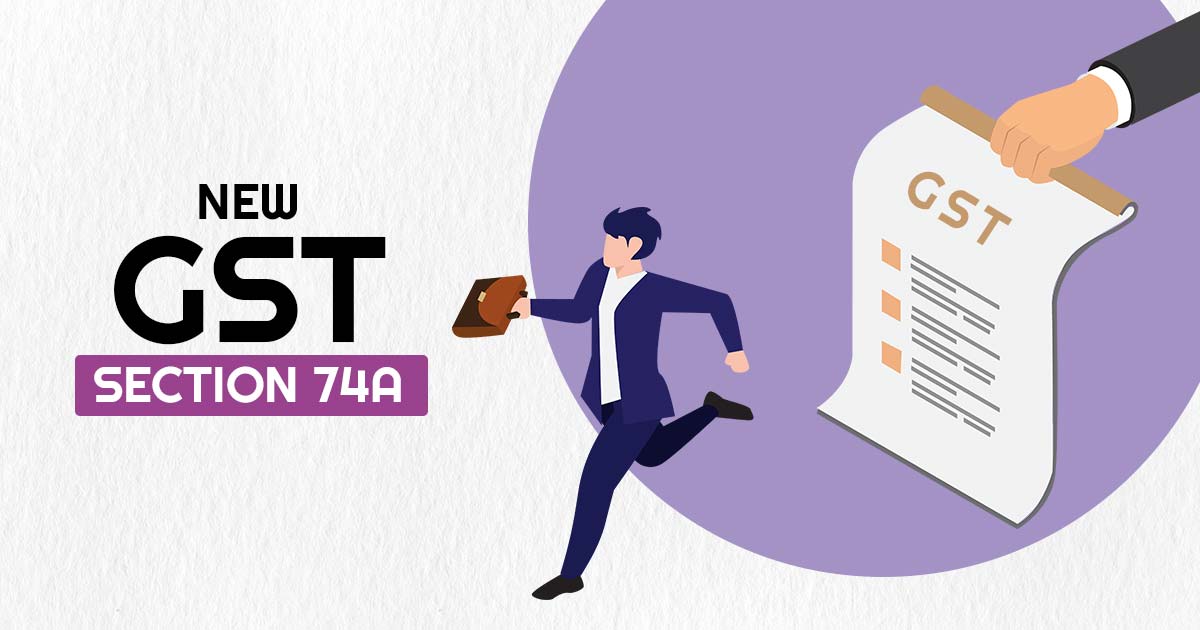
To redefine India’s tax landscape, the Finance Minister’s Budget 2024 presentation in Parliament shows a game-changing addition to the GST framework. The updated section 74A changes GST compliance and enforcement in the country. Taxpayers, businesses, and tax professionals across India wish to learn about the implications of the same new section and what it demonstrates for the future of taxation.
What is GST Section 74A?
Section 74A is made to address various tax discrepancies from unpaid or short-paid taxes to false refunds and wrongly availed GST input tax credits. Its nuanced way of dealing with such problems sets it apart. The sections specify a clear distinction between inadvertent errors and willful tax evasion, forming the way for a balanced and fair tax administration. It is not only about punishing non-compliance it denotes promoting a culture of voluntary tax compliance.
Features of GST Section 74A
A feature of section 74A is the start of specific timelines for tax proceedings. The tax officers have a 12-month window to issue the orders from the notice issuance date.
In complex matters, the same could be extended by up to 6 months, however merely with proper justification and approval from senior officials.
The same approach of time-bound is an influential step for decreasing the pending tax matters and ensuring streamlined resolution of issues. This action is expected to be well-received by businesses exhausted of lengthy tax disputes.
Time Limit Under GST Section 74A
As the new sections 74A take center stage the current sections 73 and 74 are getting ended. The 36-month time limit for issuing the demands for u/s 73 and 60 months for u/s 74 would soon be finished. The updated time limit to issue the demands will be 42 months.
Also, the provisions for suppression of facts or wilful misstatement for an extended duration to issue the demand shall indeed be a thing of former time. The new Section 74A will contain these features solely for penalty determination, marking a shift in the approach to tax enforcement.
Penalty Provisions Under Section 74A
Section 74A introduces a tiered system of penalties and compliance options aimed at encouraging tax compliance. It effectively creates a ‘carrot and stick’ approach.
For cases without fraud or willful misstatement, the assessees can pay the full tax amount along with the interest before receiving a notice, therefore avoiding any penalty.
If a Show Cause Notice (SCN) has been issued, taxpayers are provided 60 days to pay the tax and interest without incurring a penalty. When fraud or willful misstatement is involved, a reduced penalty of 15% of the tax amount applies if paid before the notice is served. If paid within 60 days of notice issuance, the penalty is 25%, and if paid after an order is communicated, the penalty increases to 50%.
Major Terms in Section 74A
The most influential contribution of Section 74A is the transparency it draws to the major terms. For example, it furnishes an accurate definition of suppression as the non-declaration of the facts or the data needed in the returns or the additional documents or the failure to provide the data when sought by the proper officer in writing. The definition gives little space for misinterpretation, lessening the importance of precise self-assessment and timely GST payment.
The provisions for the lessened penalties for voluntary disclosure before notice issuance motivate the assessees to come forward with any discrepancies they encounter in their business.
For businesses, the implications are significant. Companies will be required to update their compliance systems to ensure accurate tax calculations and on-time payments. It is essential to train finance teams on these new provisions to avoid unintentional non-compliance. Periodic tax health check-ups will help to proactively identify and rectify discrepancies.
Businesses ought to be prepared for more stringent scrutiny, particularly in matters that have ITC claims.
All over the nation, tax experts have been faster to weigh in on the implications of section 74A. Various people see it as a balanced approach that motivates the honest assessees, to choose strict measures against the evaders.
Read Also: New Complexities While Claiming GST ITC for Businesses
Some experts appreciate the clear definitions and procedures outlined in the new law but warn that businesses will have to invest significantly in overhauling their compliance systems.
Section 74A signifies a fundamental shift in India’s approach to tax compliance and enforcement, going beyond just a change in tax law. It seeks to build a more transparent, efficient, and fair tax ecosystem by balancing strict measures against tax evasion with incentives for voluntary compliance.
Since India is moving forward on this journey towards GST 2.0, section 74A’s success will depend on its execution on the foundation and the readiness of both the tax administration and assessees to opt for it. It is also true that the Indian tax landscape shall never be the same again.